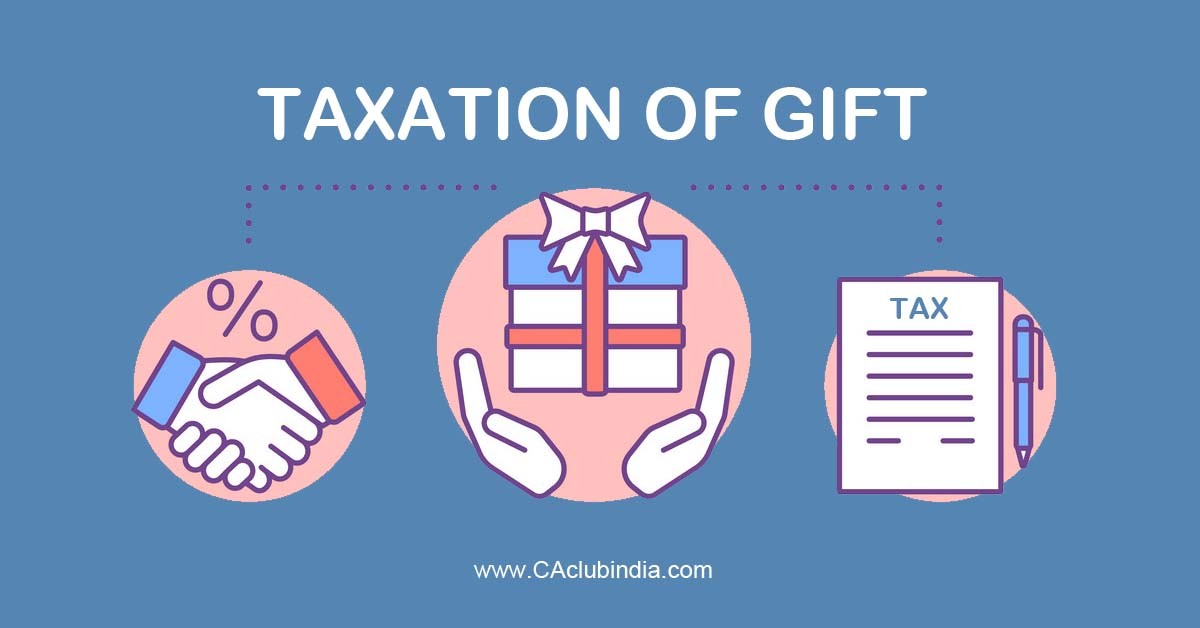INTRODUCTION
Gift received by any person or persons are taxed in the hands of the recipient under the head Income from other sources and at normal tax rates. The provisions relating to gift tax have been dealt with under Section 56(2)(x) of the Income-tax Act, 1961.
APPLICABILITY
The Provisions of Section 56(2)(x) would apply only to the specified property which is in the nature of a capital asset of the recipient and not stock in trade, raw material or consumable stores of any business of the recipient. Therefore only transfer of a specific capital asset without consideration or for inadequate consideration would attract the provisions of section 56(2)(x).

NON APPLICABILITY
Any sum of money or value of property received in the following circumstances would be outside the ambit of section 56(2)(x).
- From any Relative; or
- On the occasion of the marriage of the individual; or
- Under a will or by way of inheritance;or
- In contemplation of death of the payer of the payer or donor, as the case may be; or
- From any local authority as defined in explanation to section 10(20); or
- From any fund or foundation or university or other educational institution or hospital or other medical institution or any trust or institution referred to in section 10(23C); or
- From any trust or institution registered under section 12A or 12AA; or
- From any fund or trust or institution or any university or other educational institute or any hospital or other medical institution referred to in Section 10(23C)(iv)/(v)/(vi)/(via); or
- By way of transaction not regarded as transfer under section
47(i)/(iv)/(v)/(via)/(viaa)/(vib)/(vica)/(vicb)/(vid)/(vii); or - From an individual by a trust created or established solely for the benefit of the relative of the individual'; or
- From such class of persons and subject to such conditions, as may be prescribed.
MEANING OF CERTAIN TERMS
(A) Capital Asset
- Immovable property being land or building or both,
- Shares and securities,
- Jewellery,
- Archaeological Collections,
- Drawings,
- Paintings,
- Sculptures,
- Any work of art or bullion
(B) Relative
In case of an Individual
- Spouse of the individual;
- Brother or sister of the individual;
- Brother or sister of the Spouse of the individual;
- Brother or sister of either of the parents of the individual;
- Any lineal ascendant or descendant of the individual;
- Any lineal ascendant or descendant of the spouse of the individual;
- Spouse of any of the persons referred to above.
In the Case of HUF, any member thereof
SUM OF MONEY
If any sum of money is received without consideration and the aggregate value of which exceeds Rs 50,000, the whole of the aggregate value of such sum is chargeable to tax.
IMMOVABLE PROPERTY (LAND OR BUILDING BOTH)
1. If an immovable property is received
Without Consideration
The Stamp duty value of such property would be taxed as income of the recipient, if it exceeds Rs 50,000.
For Inadequate Consideration
If consideration is less than the stamp duty value of the property and the difference between the stamp duty value and consideration is more than higher of Rs 50,000 and 10% Consideration, then the difference between the stamp duty value and the consideration shall be chargeable to tax in the hands of the assessee as Income from other sources.
NOTE: The above Limit shall be considerd for each Property Separately.
2. Value of property to be considered where the date of agreement & date of Registration are not the same
The stamp duty value may be taken as on the date of agreement instead of date of registration, provided whole or part of the consideration has been paid by way of an account payee cheque or an account payee draft or by use of electronic clearing system through bank account or through other such prescribed electronic mode on or before the date of the agreement.
Electronic Modes Notified are as follows:
(a) Credit Card, Debit Card
(b) Net Banking
(c)IMPS
(d) UPI
(e) RTGS
(f) NEFT
(g) BHIM
Refer CBDT Notification No. 8/2020 dated 29.01.2020.
3. If the stamp duty value of Immovable property is disputed by an assessee the assessee officer may refer the valuation of such property to a valuation officer as referring in the case of Section 50C.
MOVABLE PROPERTY
If movable property received
Without consideration
The aggregate fair market value of such property on the date of receipt would be taxed as the income of the recipient if it exceeds Rs 50,000.
For Inadequate Consideration
If the difference between the aggregate fair market value and such consideration exceeds Rs 50,000 such difference would be taxed as the income of the recipient.
CONCLUSION
|
Nature of Asset |
Taxable Value |
|
Money |
The whole amount if the same exceeds Rs 50,000 |
|
Movable Property |
(a) Without consideration: The aggregate fair market value of the property, if it exceeds Rs 50,000. (b) Inadequate Consideration: The difference between the aggregate fair market value and the consideration, if such difference exceeds Rs 50,000. |
|
Immovable Property |
(a) Without consideration: The stamp duty value of the property, if it exceeds Rs 50,000. (b) Inadequate Consideration: The difference between the stamp duty value and the consideration, if such difference is more than the higher of Rs 50,000 and 10% of Consideration. |










 CAclubindia
CAclubindia
